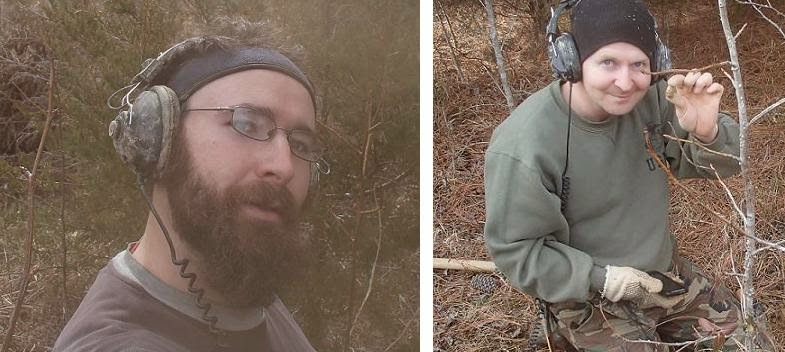Once again I can't sleep, so once again you get a nice update here at Detecting Saxapahaw! I still have a few more trips to blog about (including a great find back in early January - the suspense!), but today you'll be seeing my latest trip back to the Cavalry camp. Having already discussed a lot of the bullets that we're finding at this site, I'll be focusing this post on identifying a few fragments of history recovered out in the woods. They may not look like much, but to me, they are incredible physical reminders of those who came before us.
Dustin (R) and myself having a great day in the woods
First up are these two small, flat, brass pieces. The bar and oval each have three attachment holes on either side. Do they look familiar? Regular readers may
recall that I've blogged in the past about finding various parts of shoulder scales and their uniform attachments right here in Saxapahaw. These two pieces would have been sewn on to the uniform to attach the shoulder scale using a turnkey. The set can be reunited with the missing turnkey that I found in the same are on my
last hunt!
Next, we have this small, curved piece of brass with a hole. Just a fragment of the larger piece, it really doesn't seem like much. But like the (slightly more easily identified) example from my last hunt, this is another neck from a
cavalry spur. The entire brass spur would have been attached to the boot heel with a leather strap, and pressed into the horses side to direct movement. Both fragments are from different styles of roweled swan neck spurs. The iron rowel (a spinning disc with teeth attached to the neck) on the example from the last search still remains, but this one has been lost or rusted away entirely leaving only the hole where the rowel would have been.


The final fragment I'll talk about here is this brass stud. This one actually had me stumped for a while, and I wasn't entirely sure it was of the era. The location of the find certainly helped with the identification - since everything we had been finding was cavalry related, I was able to narrow my search considerably. Sure enough, this too is a small piece of a cavalry artifact - saddle bag stud. The saddle bags consisted of two bags (one for either side of the horse) connected by a leather strap. A hole in the leather strap allowed it to stay fixed to the saddle by placing it over this small stud post, which was attached to the saddle itself. The below example is from an 1859
McClellen saddle.
I'll close with the rest of my finds from another very successful day at the cavalry camp. I particularly like the hammered lead triangle and the half-melted sharps bullet. I believe the triangle was being shaped into a fishing sinker, as I have seen quite a few examples of similar sinkers made from bullets recovered from other detectorists (namely, the illustrious Beau, aka "Aquachigger"). Of course, we will never know for sure, but I am still very fond of any relic directly shaped by a soldier in the field, regardless of the intended purpose. The rest of the bullets include Sharps and Hankins (and bases of the brass casings), Sharps Carbine, and Colt (Dragoon and Army) pistol bullets.









I found one of the stud in my yard in Melbourne ar
ReplyDelete